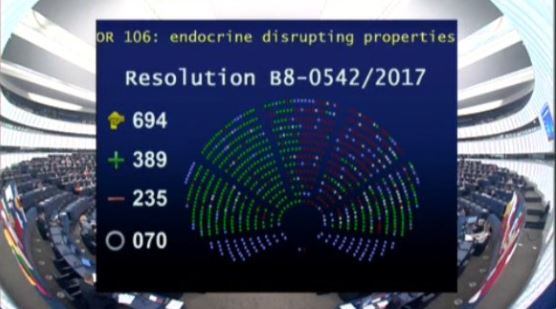The Commission must now come up with a new proposal, taking MEP's requests into account.
The Parliament, which voted on the issue this afternoon (4 October) needed an absolute majority of 376 votes to veto the proposal, which it narrowly won with 389 votes in favour, 235 against and 70 abstentions.

The objection, co-signed by MEP Bas Eickhout, a member of the Greens and European Free Alliance (EFA) party, and backed by the Committee on the Environment, Public Health and Food Safety (ENVI), said the Commission had exceeded its mandate by proposing to exempt some substances from the scope of criteria for identifying the chemicals
The Commission’s proposal can be read here.
Environmental Scientist at Pesticide Action Network (PAN), Angeliki Lyssimachou, said the vote was an example of "true democracy in action".
The result of the vote was also welcomed by pan-EU consumer group BEUC which said the Commission's "unfit definition" would have seen too many chemicals escape the regulatory net.
The ENVI committee objection reads: "The specification of scientific criteria for the determination of endocrine-disrupting properties may only be performed objectively, in the light of scientific data relating to that system, independently of all other considerations, in particular economic ones."
Exposure to these endocrine disrupting chemicals, which are used in food packaging and on pesticides and biocides in food production, has been linked to decreased fertility, a rise in endocrine-related cancers, low sperm quality, obesity and cognition deficit and neurodegenerative diseases, according to one 2015 study published in the Journal of Clinical Endocrinology and Metabolism.
Ahead of the vote, Eickhout said: "It is unacceptable that the Commission tries to lift a ban of certain endocrine disrupters via the backdoor of comitology to further the interests of the pesticides industry. The Commission has a mandate to come up with scientific criteria for endocrine disrupters, but not to undo a ban decided by the legislator.”
According to Eickhout, the vote was “an opportunity to halt the Commission from exceeding its powers, insist on the rule of law and maintain existing restrictions".
Chemicals known or suspected to be endocrine disruptors are used not just in pesticides but in food packaging, cosmetics and toys.
The Danish Consumer Council tested tins of peeled tomatoes and found five out of eight contained bisphenol A.
Meanwhile the French group UFC Que-Choisir commissioned laboratory tests and found known or suspected endocrine disruptors, such as ethylhexyl methoxycinnamate, in seven out of 17 suncreams.
Chemical cocktails
Yesterday, PAN published a report which showed the extent of endocrine disrupting pesticide residues found in EU food on the market.
Using 2015 monitoring data for 45,889 fresh fruit and vegetable samples that it acquired through a public access request, it found that just over one third (34%) of fruit consumed in Europe contained endocrine disrupting pesticides. Citrus fruit mandarins, oranges and grapefruit were the worst offenders – between 46 and 57% of samples contained residues with EDPs.
Celery and rocket were the worst offenders for vegetables, with 35 to 40% of samples containing residues.
Several fruit and vegetables contained up to eight EDPs per sample, for which the “collective toxic potential effects are not assessed”, PAN said.
The report reads: “Governments should put consumers’ health and the protection of the environment before the profit of the pesticide industry, which will always push to use more pesticides in agriculture, even though the Sustainable Use of Pesticides Directive 2009/128/EC34 calls all member states to use synthetic pesticides only as a last resource, after (and provided that) all non-chemical methods have failed.”
